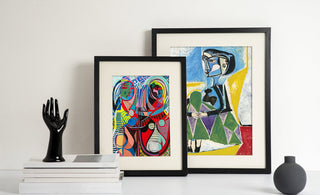
If you’re looking to start collecting art for your home, you’re in the right place. At Grove Gallery, we understand that it can be both exciting and overwhelming trying to build your art collection, which is why we are going to provide you with guidance on collecting art for your home.
Read on for our guide to collecting art for your home, whether you plan on selling the art for a profit at a later date, or simply decorating your home with beautiful artwork.
Start With Art You Love
When you’re starting small and buying the first pieces of art for your home, it’s important that you trust your instinct and choose art that you love, whether that be contemporary art, fine art, and many more. After all, you are going to be viewing the pieces you purchase every day, and want art with a design you love.
This is why we recommend that you buy what you love instead of simply opting for limited edition prints that appear valuable; you choose art that speaks to you.
Think about where you’ll place the art in your home, and whether you’ll enjoy viewing the piece day after day, appreciating its significance in art history. If you’re unaware of your style, check out a few galleries, social media, or research some up-and-coming artists and see what pieces appeal to you.
In some cases, especially if you’re new to the art world, when starting an art collection, it’s better to choose a piece from an emerging artist (artists who are still making a name for themselves, meaning their art is often more affordable, but there's a bit more risk) that you love instead.
Consider What Will Increase in Value
Many art collectors will collect art as an investment - so they can sell the pieces at a later date for a profit. If this is something that appeals to you, then you should consider what art will likely increase in value—or even retain the same value—before committing to a piece of art.
Blue-chip art (includes works by well-known artists like Picasso and Warhol, whose pieces tend to become more valuable over time) is considered a safe bet when investing in art - this refers to art created by artists with a history of producing art that increases in value.
Investing in art can be risky - no investment is considered risk-free. However, thorough research and experts who can help you choose art can increase the chances of your investment paying off.
Know Your Budget
Whether you’re a seasoned art collector or you’re just stepping foot into the art world, it’s important to understand your budget before you go looking for art. If you’re on a budget, you may find that buying art directly from the artist is cheaper than going through a third party.
If a piece of art has been previously owned and you’re purchasing it from the secondary market (e.g auction houses or an art gallery) it will likely be more expensive. Other factors can impact the price of a piece of art - for example, luxury art (masterworks and blue-chip art) will be much more expensive than prints from emerging artists.
The rarity of the piece as well as the mediums used can also impact the overall cost, as can the artist - or more specifically, the period of the artist’s career in which the piece of art was created. There may also be other costs to consider - for example, shipping costs, the cost of framing the pictures, insurance and more. If you purchase art at an auction, you may also be required to pay the buyer’s premiums too.
Check Out Art Galleries
Regardless of whether you have an existing art collection or you’re ready to buy your first piece of art, it’s always beneficial to explore art galleries. At an art gallery, you can view entire exhibitions from a range of artists.
There are many different types of art galleries - some art galleries focus on a particular artist or style of art, whereas others will feature a range of pieces from many different artists.
At our very own Grove Gallery, we display art from both exciting emerging artists and blue-chip artists. As well as viewing art, you can also invest in art with Grove Gallery.
Go To An Art Fair
Art fairs can be a great place to discover art from up-and-coming artists or purchase pieces of art from trusted industry names. If you’re building your collection for profit, you may benefit from having an art consultant and conducting thorough research beforehand.
Although you can find quality art that will increase in value at prestigious art fairs, there is no guarantee that a piece you purchase will increase in value or even hold the same value. If, however, you’re looking for art to hang on your walls at home, art fairs are a great place to start.
You can find work from lesser-known artists - and although they may not see a huge increase in value, they are sure to look great in your living room, office, or bedroom.
Obtain The Right Documents
When purchasing art, especially if you plan on selling the piece at a later date, be sure to receive the right certifications of authenticity and provenance. This will essentially outline the ownership history of the piece, tracing all the way back to the creation of the piece. If this is a piece of art from the primary market, there won’t be much to see - however, secondary pieces may have pages and pages of history.
These documents are imperative for providing the authenticity of a piece of art. The documentation you receive should also show the amount of money that the art has been sold for in the past, ultimately telling the story of the artwork.
It’s not just acquiring the documents that you should consider - you also need to think about keeping the files safe and secure. It may help to store digital copies for added security.
Work With An Art Advisor
Art advisors are extremely helpful when it comes to not only buying art for your art collection but selling your owned art pieces too. Different art advisors will have different fee structures - some will work on commission, whereas others will work on a retainer. You can also find art advisors that operate on an hourly fee, with different rates depending on the services.
At Grove Gallery, we have expert impartial art advisors on hand to assist you with your art investment needs with years of experience, helping clients from all over the world. Contact us today or visit our London art gallery to learn more about how we can help you on your art collecting journey.






